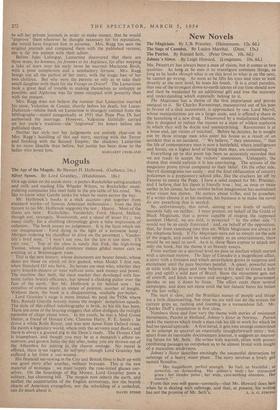Moguls
OUR age dotes on the inside story: it prefers Rockefeller eating crackers and milk and reading Ella Wheeler Wilcox, to Rockefeller mani- pulating companies like steel balls in the pin-table of his mind. We like to know what Gatsby looks for when he stares across the bay.
Mr. Holbrook's books is a slick account—put together from standard works—of famous American millionaires : from the first tycoon to (as Mr. Holbrook suggests) the last : Hearst. Most of the titans are here : Rockefeller, Vanderbilt, Ford, Hearst, Mellon, though not, strangely, Woolworth, and a shoal of lesser fry ; too many really, for a shuttling chronology gives a false impression of cohesion. The book passes no judgement. It is the facts which stir our imagination : Ford dying in the light of a kerosene lamp ; Morgan ordering his chauffeur to drive on the pavement ; Vander- bilt's brief note, ` I won't .sue you, for the law is too slow. I'll ruin you." Top of the class is surely Jim Fisk, the high-living Yankee, whose gold-plated existence makes gilded motor cars as exciting as a Brummagem tram.
This is the new history, whose documents are bearer bonds„whose dates are those on which oil first gushed, when Model T first ran, when Standard Oil was born. Its heroes are men who, whether they carry kriuckle-dusters or wear well-cut suits, seek money and power. The machine they built, the mass market they developed with fan- tastic (often brutal) efficiency, has spread a clanking pallor over the face of the earth. But Mr. Holbrook is far behind now : his omnibus of colossi needs an ounce of polemic, another of insight. Without them, the book is a disappointing, readable pot-boiler.
Lord Grantley's stage is more limited, its peak the 1920s where Mrs. Ronald Greville bravely resists the moguls' demolition squads. The style of this edited autobiography is brisk, as his life has been. There are none of the braying sniggers that often disfigure the twilight memoirs of chaps about town. In his youth, he was a Mad Green Hatter, a friend of Horace Cole, Clarence Hatry, F. E. Smith ; he drove a white Rolls Royce, and was sent down from Oxford twice. He paints a legendary world, where only the servants read Burke, and there is always a greased pig in the Dean's study. •The Drones Club is triumphant, and though you may be at a monarch's elbow to- morrow, and govern India the day after, today you are thrown out of the Alhambra for joining in the chorus onstage. No moral is offered, there is -no regret, no self-pity--though Lord Grantley has suffered a lot from a war-wound.
His financial see-sawing in the City and British films is built up with one good story after another, without bravado. This is the raw material of nostalgia : we must supply the rose-tinted glasses our- selves. On the hoardings of Big Money, Lord Grantley posts a solitary, but charming bill. The moguls now inherit the earth, and neither the eccentricities of the English aristocracy, nor the boyish charm of American evangelists, nor the rebuilding of a cathedral,


































 Previous page
Previous page